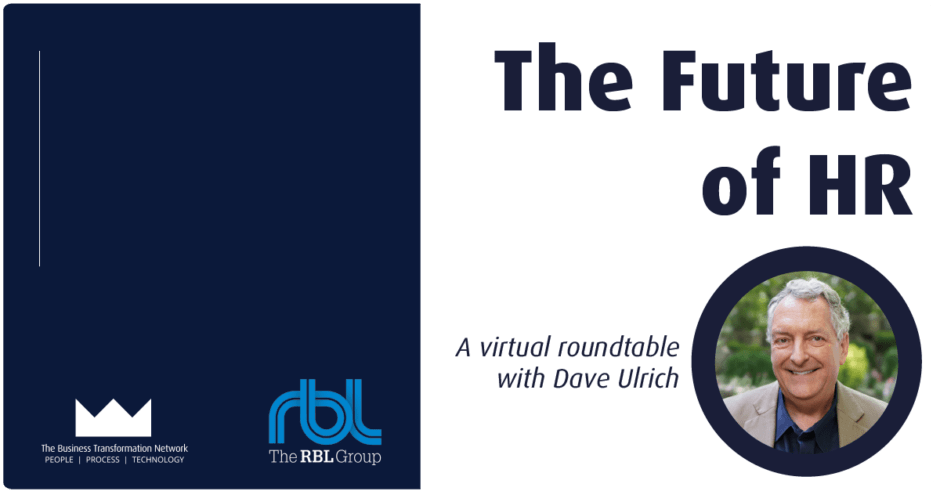The BTN was delighted to be joined by the ‘Father of HR’, Dave Ulrich, for a VIP roundtable with senior HR leaders.
Dave has received a number of accolades throughout his career such as being named #1 thought leader in HR by HRD Connect in 2019, ranked #1 speaker in Management/Business by Speaking.com and named the most ‘influential HR thinker of the decade’.
Dave started the conversation by looking at what HR looks like post-COVID and what HR’s future value creation is shaping up to be. HR has evolved from being an administrative area of the business to one that now can provide strategic direction and has a seat at the table.
Organisations have been striving to offer employees a sense of belief, the ability to become better and a feeling of belonging as part of their employer value proposition, but what is the most important thing that an organisation can give an employee? The answer is quite simply an organisation that succeeds in the marketplace.
Dave began by looking at who the HR stakeholders are when HR is thinking ‘Outside-In’ when it comes to investors/owners, customers, employees, social citizenship responsibility, partners and line managers.
Within this discussion, the emerging trends in the 9 ‘Domains of HR’ were covered. This alignment with the evolution of HR plays very much into a methodology that Dave has been speaking about for a few years now, that HR is not about HR, HR is about a business succeeding in a marketplace.
The 9 domains looked at some of the key components that make up a successful HR strategy. Within these are HR Reputation, HR Customers, HR Purpose, HR Design, Organisation Capability, HR Analytics, HR Practices, HR Professionals and HR Relationships. Each of these components has its own stage of HR department maturity within its domain. Dave spoke with the group through each of these trends looking at how each trend should have a foundation or administrative stage, then it should have a functional stage, followed by a strategic stage and finally an ‘Outside-In’ stage. By looking at your own HR department, you can score yourself against each stage and see where can be improved, but each time looking at the end goal of ‘HR Outside-In’. In the discussion, the domain of HR Reputation was discussed and the question you could ask yourself ‘what are the top 3 things we would like our HR group to be known for’, and then ask your organisation when they think of Human Resources, what comes to mind and align the commonalities?
Dave looked at each of the trends and the stages, aligning them to real HR examples such as, culture and what the value of culture is in the marketplace. If your company culture doesn’t create value for the business that has an impact ‘Outside-In’, then are you just doing it to align with market trends?
Purpose plays a huge part in the employee value proposition and your HR strategy statement should play a key role in those within and outside the HR community, understanding what the aim is of the HR department. HR design, once again, plays a huge role and running the HR function as if it is a business within a business can have a huge impact on the success of an HR team. Organisational capability looked at what must be in place to meet the company vision and goals, which then moved the conversation onto the role of HR Analytics and the end goal of showcasing guidance for stakeholder value.
How the business creates and deploys HR practices should be scrutinised and what our HR professionals need to be, know and do to be effective is crucial to success and heavily impacts the HR department maturity levels.
Finally, the discussion moved to the value of HR relationships and how HR goes about its work with evolution as an individual contributor to a team player, to members of business teams and then building relationships with external stakeholders.
Dave finished with how HR gains its competitive advantage and if we are going to win in a marketplace through our financial, technology and strategic agenda, then we need to understand where we should invest in our talent. The ‘Outside-In’ concept is the goal and aim but unless we do the basics, the journey will fail.
The conversation stemmed on to some of the challenges the HR function is facing in the current climate and how concepts such as agile HR and employee experience are being spoken about widely within the function but are they new methods or just existing methods with a new name? An organisation will always have to respond to the external conditions; context is the kingdom in which we operate. If we can’t respond internally within our organisations to the outside, we lose. Historically, we always needed to manage complexity and change but as the business world has evolved, we now have uncertainty and no longer change, but the speed of change instead. We can only manage this by building within the organisation the capabilities to respond to the outside context. The role of the CHRO is, therefore, to look at what role agility plays and how we can focus forward, anticipate opportunity, move quickly and learn always.
We should never do HR for the sake of HR, it should always be there as a nucleus for improving the organisation as a whole. If you are a ‘functional organisation’ then there should be functional HR to align with this, if you are a divisional organisation then create separate HR groups in each of the divisions. The HR function should always align with where the business is going.
This event was in collaboration with The RBL Group, an organisation that strives to increase stakeholder confidence and create extraordinary value by showcasing the value of HR & leadership.





